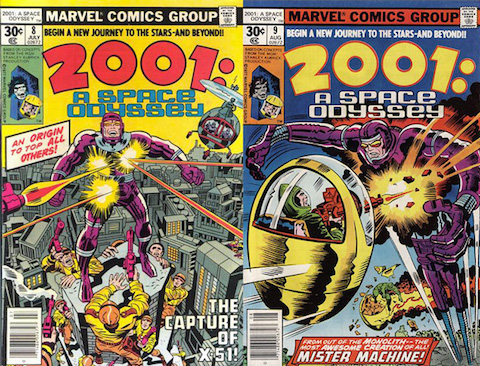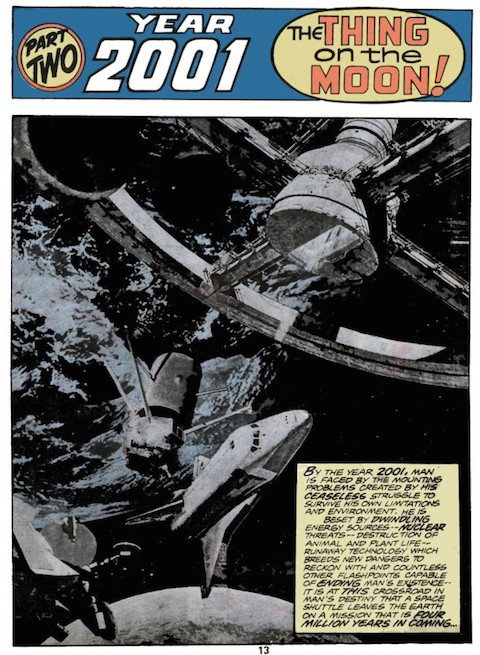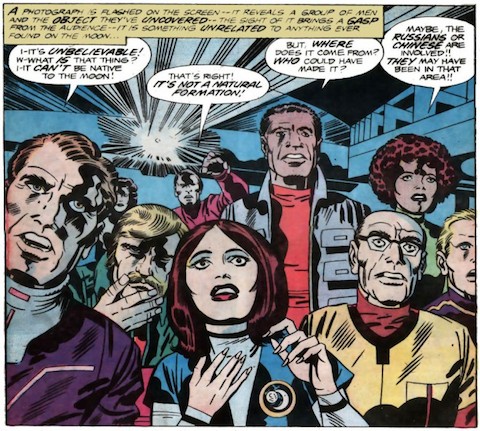
Sure, we all enjoyed the adaptation of 2001: A Space Odyssey presented on the Howard Johnson’s children’s menu from 1968 that we featured last May. But would you believe that, when you swap out the name Howard Johnson for that of Jack Kirby, you get a work of higher artistic merit? In his long career, the widely respected comic book artist, writer, and editor put in time on both the DC and Marvel sides of the fence. 1976’s 2001: A Space Odyssey comic book, a meeting of Kirby’s mind with those of Stanley Kubrick and Arthur C. Clarke, marked his return to Marvel after spending the early 70s at DC.
Kubrickonia, which calls the commission “a match made in bizarro world heaven,” describes the product: “The adaptation was written & penciled by Kirby with inking duties carried out by Frank Giacoia. The almost 2 times larger than the regular comic-book format suited Kirby’s outlandish pop style, but this was a great talent merely going through the motions.” The Sequart Organization’s Julian Darius calls it “surely one of the strangest sci-fi franchise comics ever published,” a stuffy marriage between Kirby’s “bombastic,” “action-oriented,” “in-your-face” art and the style of Kubrick’s film, one “all about the subtle. No one ever accused Kirby of being subtle. Indeed, his almost complete lack of subtlety is part of his charm, but it’s not a charm one could possibly imagine fitting 2001.”

At The Dissolve, Noel Murray includes an examination of Kirby’s 2001 in the site’s “Adventures in Licensing” column. Kirby’s description of Kubrick’s immortal millennia-spanning match cut, which the article quotes as an opener, tells you everything you need to know:
As the surge of elation sweeps through him, Moonwatcher shouts in victory and throws his weapon at the sky!! Higher and higher, it sails — aimed at the infinite where the countless stars wait for the coming of man… And, man comes to space!! Across the agonizing ages he follows the destiny bequeathed to him by the monolith.
2001: A Space Odyssey in comics, which comprises not just the oversized book but ten monthly issues that expanded upon the film — taking it in, shall we say, a different direction than either Kubrick or Clarke might have envisioned — has, as you can see, inspired no small amount of discussion among science fiction and comic book enthusiasts. Darius wrote a whole book called The Weirdest Sci-Fi Comic Ever Made. At SciFiDimensons, Robert L. Bryant Jr. and Robert B. Cooke offer two more analyses of this unusual chapter in the history of American sequential art. Whatever its merits as reading material, it shows us that genius plus genius doesn’t always produce genius — but it never fails to produce something fascinating.
You can check out scans of the first issue of 2001: A Space Odyssey over on this web site.

Related Content:
Howard Johnson’s Presents a Children’s Menu Featuring Kubrick’s 2001: A Space Odyssey (1968)
Isaac Asimov Predicts in 1964 What the World Will Look Like Today — in 2014
Arthur C. Clarke Predicts the Future in 1964 … And Kind of Nails It
Colin Marshall hosts and produces Notebook on Cities and Culture as well as the video series The City in Cinema and writes essays on cities, language, Asia, and men’s style. He’s at work on a book about Los Angeles, A Los Angeles Primer. Follow him on Twitter at @colinmarshall or on Facebook.


Leave a Reply